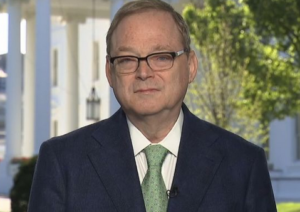In a recent interview, Kevin Hassett countered claims of chaotic economic policy under Trump, framing it as a strategic, high-speed initiative to reshape trade dynamics while negotiating with over 130 countries for lower tariffs and better export terms.
Trump Administration's Economic Strategy: Calculated Urgency, Not Chaos

Trump Administration's Economic Strategy: Calculated Urgency, Not Chaos
National Economic Council Director Kevin Hassett defends the Trump administration's economic agenda, emphasizing a structured approach to trade reform and domestic industry strengthening.
The National Economic Council Director, Kevin Hassett, strongly rebutted accusations that the Trump administration’s economic policy is chaotic, asserting instead that it is a meticulously planned approach aimed at revitalizing global trade and enhancing domestic industry. During his appearance on CNN’s State of the Union, Hassett likened the administration's strategy to a "two-minute offense" in football, signifying swift and decisive action across various economic fronts such as tax reduction, deregulation, and proactive trade reforms.
Central to this initiative is the Reciprocal Trade Act, which Hassett claims seeks to address a pressing issue: the United States' overdependence on foreign goods, particularly in crisis situations. He noted that negotiations are currently underway with 130 countries, all responding to the U.S. offer of reciprocal treatment regarding tariffs—many of which could drop to as low as 10%.
Hassett acknowledged that while discussions with China remain in their initial stages, there has been significant momentum with other nations eager to form equitable agreements with the United States. “It’s orderly, it’s clear, and countries are presenting serious offers,” he said. In light of criticisms regarding the administration’s pace and strategic direction, Hassett emphasized that the unfolding economic agenda is a product of calculated urgency, asserting that the U.S. is finally taking the offensive in a global landscape where it has often been on the defensive.






















